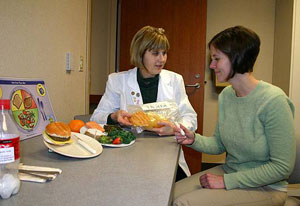Dietitian
Tasks & duties

Clinical dietitians (in hospitals), community dietitians (in the wider community) and private practice dietitians may do some or all of the following:
-
receive referrals from patients, or their doctor or hospital
-
gather relevant information about patients
-
counsel patients about their lifestyle and eating habits
-
plan special diets or provide specialised nutrition support for patients
-
conduct research and present case studies at seminars
-
lecture at universities/polytechnics on the topics of diet and nutrition
-
provide nutritional information to food industry organisations
-
provide nutritional information to sports and fitness centres and elite athletes (professional and amateur)
-
work with drug companies to market specialist nutritional products
Public health dietitians (who promote public health) may do some or all of the following:
-
gather information about nutrition
-
develop the information into resources such as books and leaflets
-
develop and implement nutrition programmes in communities to promote good health and nutrition
-
work with retailers and manufacturers to improve access to healthy food options
-
present public health information on radio and television
-
advise on food and nutrition guidelines
Food service dietitians (who work in hospitals or in the community) may do some or all of the following:
-
manage the food service, including staff and financial management
-
plan menus
-
plan and design kitchens
-
advise and educate other health professionals
-
act as consultants to the food industry
-
implement food safety policies
Skills & knowledge

Dietitians need to have knowledge of:
-
food and its nutrients, including the nutrients needed for human health
-
how food is digested and absorbed
-
science, including physiology, biochemistry and nutrition
-
how patients may respond to advice and treatment
-
health and nutrition research techniques
-
food preparation techniques
-
different cultures, and an understanding of their beliefs and protocols relating to food
-
public health systems
-
business and management skills, including the ability to manage people and resources
-
communication skills
-
planning, time management and organisational skills
Entry requirements
To become a dietitian, you need to have a Bachelor of Science (BSc) or a Bachelor of Consumer and Applied Sciences, majoring in Human Nutrition and Food Service Management. You also need to have a Postgraduate Diploma in Dietetics.
Secondary education
A tertiary entrance qualification is required to enter further training. Useful subjects include biology, chemistry, maths and English.
Training on the job
Skills are gained on the job. Dietitians are encouraged to take courses to keep themselves up to date with information. The Dietitians Board has a Continuing Competence Programme (CCP), which involves dietitians attending courses and conferences to update their skills and knowledge, so they can reapply for their Annual Practising Certificate.
Registration
Registration with the NZ Dietitians' Board is required to practise as a dietitian.
Useful experience
Useful experience for dietitians includes work in a hospital kitchen or restaurant, or food-preparation work. Teaching or staff management experience is also useful, as is work with people of different ages and cultural backgrounds.
Related courses
Food Science and Biotechnology
Nutrition and Dietetics
For more information, please refer to Career Services.
Document Actions
